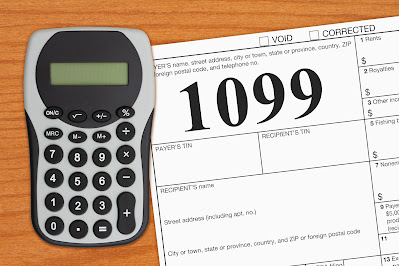What is a 1099 Form?
The IRS 1099 Forms are a group of tax forms that document payments made by an individual or a business that typically isn’t your employer. The business that pays the money fills out the form with the appropriate details and sends copies to you and the IRS. The form reports payments made during the tax year. In some instances, a copy is also sent to your state taxing authority. The payer is responsible for filling out the appropriate 1099 tax form and sending it to you. The IRS requires payers to provide most 1099 forms by January 31. In certain instances, the date is February 15.
What is a 1099 Form used for?
A 1099 Form documents payments from someone that typically isn’t your employer. This can be an individual, business, or entity, such as the government. There are different 1099 forms that report various types of income and how they were earned. These payments might be for interest, dividends, non-employee compensation, retirement plan distributions.
If you receive a 1099 form, it’s your responsibility to report the income earned on your tax return.
Who receives a 1099 Form?
Some common examples when you might receive a 1099 include:
- You should receive a Form 1099-NEC if you earned $600 or more in nonemployee compensation from a person or business who isn’t typically your employer.
- You should receive Form 1099-MISC if you earned $600 or more in rent or royalty payments.
- You should receive Form 1099-G if you received a state or local tax refund during the previous year.
Likewise, if you paid a freelancer, independent contractor or other non-employee $600 or more during the year related to your trade or business, you likely should send them a Form 1099-NEC.
Who sends 1099 forms?
Several types of 1099 forms exist to document payments made between individuals or businesses and another party. You can receive various 1099 forms for different reasons.
One of the most popular 1099 forms is the 1099-NEC for Non-employee Compensation payments. If you’re an independent contractor or freelancer, you may receive a Form 1099-NEC documenting payments made to you throughout the year from a particular payer.
Payers who make Non-employee Compensation payments below $600 are typically not required to file the 1099-NEC unless the payer withholds any amount of tax from the payments. However, they may do so if they wish. If you received less than $600 from a payer, you are still required to report the income on your tax return.
What do I do if I don’t get all of my 1099 forms?
Even if you don’t receive the appropriate forms, you’re still responsible for paying taxes on all of your taxable income. If you didn’t receive a 1099, you still need to report the appropriate amount of income on your tax return. This will help you avoid a bill from the IRS for owed taxes and possible penalties.
If you haven’t received all your 1099s by the January 31st or February 15th deadlines, contact the person or business responsible for sending you the 1099 and request that they send you a copy of your 1099.
Can I file a 1099 Form electronically?
Yes, 1099 Forms can be filed electronically. You can file your 1099 form through tax service software or on paper forms. Filing tax forms electronically can offer several benefits, such as:
- faster processing times
- improved accuracy
- increased security
- ability to track the status of your tax return


No comments:
Post a Comment